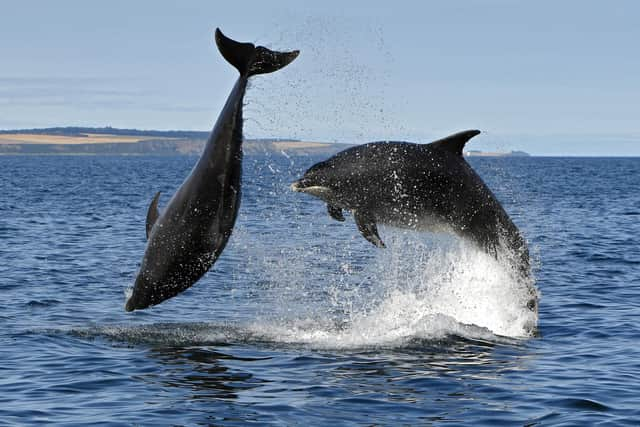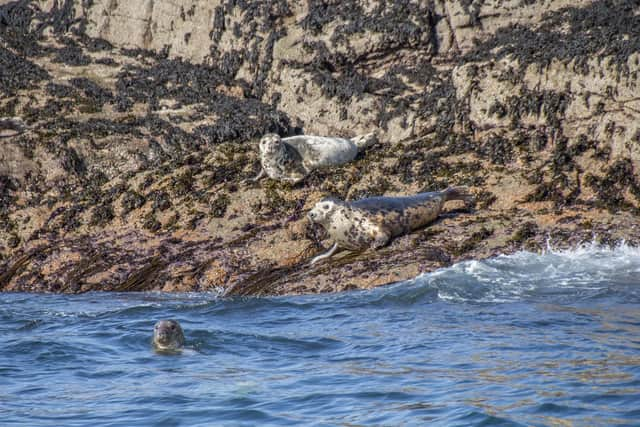Call for ban on trawling, offshore turbines and fish farms in Scotland’s fragile sea areas to boost wildlife and tackle climate change
Scottish ministers have committed to protecting 30 per cent of the country’s waters for ecosystem recovery by 2030.
But a briefing document prepared by Scottish Environment Link concludes that the network of Marine Protected Areas (MPAs) does not effectively safeguard the species and habitats it is designed to conserve.
Advertisement
Hide AdAdvertisement
Hide AdAmbitious action is urgently needed to allow the recovery of the marine environment so it can help tackle the interlinked climate and nature crises, the group has said.
Marine ecosystems such as seagrass and seafloor sediments are crucial in the fight against climate change, with Scotland’s seabed and sea lochs annually sequestering three times as much carbon as forestry.
They also provide important nursery grounds for myriad fish and shellfish, including valuable commercial species.
The campaigners stress that existing and new sites must be “truly protected from damaging activities” to help restore Scotland’s seas to health.


This would mean designation of at least 10 per cent as new Highly Protected Marine Areas, where only the least invasive practices – such as hand-diving and some leisure pursuits – could take place under strict controls.
The MPA network covers 37 per cent of Scotland’s seas, but the campaigners say the majority of sites “exist in name only”, lacking ecosystem-based spatial management of fisheries and other human activities.
They are calling for a package of measures, including targeted recovery of damaged seabed areas and critical habitats for vulnerable or declining species; a minimum size for sites should be set, to create the best conditions for recovery; and management should take account of the wider ecosystem rather than a patchwork of individual remnant features.
They say ensuring Scotland’s marine environment is in the best possible condition will benefit everyone – including industry.


Advertisement
Hide AdAdvertisement
Hide AdCalum Duncan is head of conservation for Scotland at the Marine Conservation Society, which is part of the coalition.
“Scotland’s seas are globally important for cold-water corals, flameshell beds, seabirds, seals, whales and dolphins, basking sharks and many other species and habitats, but they face increasing pressure from climate change and industry,” he said.
“Recovering the health of our seas is one of the most important actions we can take in the fight against climate change.
“We welcome the commitments made to increase the levels of protection and urge the Scottish Government to take the ambitious and urgent action necessary to put our seas on course for recovery by 2030.


“This must mean adopting the highest international standards in those new areas to be identified as Highly Protected Marine Areas, so they are fully protected from all extractive and destructive activity.
“Crucially, all existing sites must also be urgently protected from the most damaging activities so that only low-impact, sustainable activities are allowed.
“We know that Scotland's seas, coasts and marine wildlife are globally important and so it is vital that at least 30 per cent are truly protected from damaging activities to help drive urgent ocean recovery.”
Link members have based their recommendations on the MPA Guide, which includes advice set out by the International Union for Conservation of Nature.
Advertisement
Hide AdAdvertisement
Hide AdA Scottish Government spokesperson said: “The Scottish Government is committed to designating Highly Protected Marine Areas (HPMAs) covering at least 10 per cent of Scotland’s inshore and offshore waters by 2026 – before the end of the current Scottish Parliamentary term. Part of the Bute House Agreement with the Scottish Green Party, this is a world leading commitment - it meets the EU target of 10 per cent but in a shorter timeframe. HPMAs will prohibit all extractive, destructive, depositional activities and allow other activities only at non-damaging levels.
“Scotland’s Marine Protected Area (MPA) network already covers in excess of 37 per cent of our sea area, exceeding the proposed new global target of 30 per cent coverage by 2030. Management measures are designed to protect the specific features of each site and vary between MPAs. We have committed to delivering fisheries management measures for existing MPAs, where these are not already in place, by March 2024 at the latest.
“Sustainability, support for biodiversity and consideration of the wider ecosystem is at the heart of how we manage Scotland’s waters and fisheries. Our Fisheries Management Strategy sets out policy initiatives for the next ten years, which will protect the environment, and ensure that we manage our sea fisheries in a responsible and sustainable way.”
Comments
Want to join the conversation? Please or to comment on this article.
